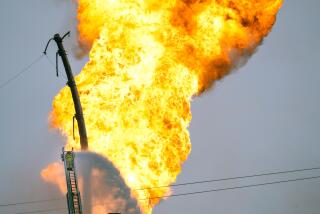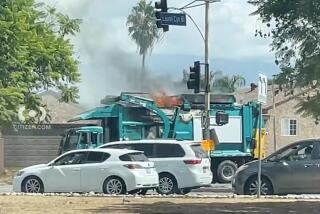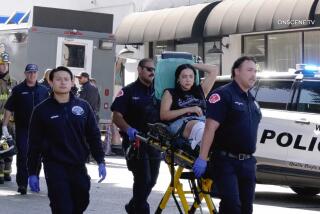For Town, End to Derailment Ordeal Is in Sight
- Share via
WEYAUWEGA, Wis. — A column of smoke that spiraled over this central Wisconsin farming town Sunday may signal the winding down of an ordeal that began when a train hauling propane tanker cars derailed a week ago, forcing 1,700 residents to flee their homes.
At daybreak, technical crews began the risky work of draining liquid propane from 12 of 14 derailed tankers and burning off the explosive cargo in an excavated pit surrounded by a gravel berm.
As of Sunday evening, two of the tankers had already burned off their propane, four were intact and eight others were either burning or contained volatile vapors. An explosion could kill everybody within 800 feet and spew metal fragments and glass as far as 1 1/2 miles, officials said.
“We’re turning the tankers into giant Bic lighters and then purging them of vapors by pumping in [nonflammable] liquid nitrogen,” said Wisconsin National Guard Lt. Col. Peter Fox. “It is an extremely dangerous process. On a danger scale of 1 to 10, with 10 being worst, this situation is still a 10.”
The effort to burn off the more than 1 million pounds of propane was the first visible sign that the residents who were evacuated last Monday with no time to grab checkbooks, clothes, provisions or pets may be returning home sooner than had been predicted.
The displaced residents initially thought they would be able to return home within hours of the predawn crash that ignited propane leaking from overturned cars and destroyed a feed mill.
Instead, the evacuation of residents living within two miles of the derailment in this town about 150 miles northwest of Milwaukee stretched out to a week. It may last another two weeks.
In the meantime, life has come to a screeching halt in Weyauwega, a town where hundreds of people are now out of work, 1,400 public and parochial students are out of school, cows have gone without milking so long that they may have to be destroyed, food is rotting on store shelves and water pipes have frozen, burst and flooded basements.
Terry Corson, operations manager for Wisconsin Central Ltd., has assured residents that the railroad will compensate them for all damages and costs for lodging, food, lost wages and dead pets and farm animals.
But for some the costs go beyond money.
Evacuee Gordon Niemuth, 64, worked a lifetime to develop a prize herd of 75 milk cows. On Saturday, he was treated at a local hospital for stress resulting from the prospect of having to destroy the cows, which are roaming unattended and bloated with milk. That condition can lead to mastitis, an inflammation of the udder that can make the milk unusable.
Officials of the State Division of Emergency Government said it will be several days before even rough estimates of what the train wreck is costing the town will be available.
Staring longingly at the smoke visible from the window of his realty office a few miles from the crash site, Steve Loehrke sighed and said: “It looks like the end of this crisis is in sight.
“It’s been an emotional experience that hasn’t reached its apex yet. But we’re a small, rural farming community with strong traditional values, and we’ll hold together.”
At the Grand Seasons hotel in Waupaca, about 10 miles northwest, evacuee Sara Stuebs also felt a sense of relief. But she worried about the 24 workers from Texas and West Allis, Wis., who are draining the tankers--technicians in the “hot zone” who would surely die should the tankers blow up.
“We’ll be praying for them,” said Stuebs, 40. “We’re praying that it goes the way they want and that nobody gets hurt.”
The process of removing the propane from the toppled tankers will take place only during daylight hours, Fox said. The goal is to “flare” three cars a day.
“This is not unlike a giant game of pickup sticks, except that the crews are working with very, very complicated life-or-death equations,” Fox said. “These people are putting their lives on the line for all of us.”
But the mood at the site is “way up,” he added, “because of the progress we’re making and the favorable weather. Things are clicking. I’ve even been accused of smiling.”
Many evacuated families are staying with relatives or friends, or at area hotels and motels, including the Grand Seasons, where general manager George Pappas is “breaking some rules to take in a whole community.”
On Sunday, guests at the 90-room hotel included squawking birds, barking dogs, ducks, chickens, rabbits, an iguana and a Vietnamese potbellied pig named Hector--as well as dozens of schoolchildren who spend their time running between the indoor pool and the video arcade.
“We would never allow a potbellied pig here,” Pappas said. “But I have to admit, that’s the cleanest potbellied pig I’ve ever seen. It’s on a leash and litter-box trained.”
Many of the animals were rescued on Saturday, when 140 residents wearing flak jackets, helmets and earplugs entered the abandoned city--18 at a time--in armored personnel carriers driven by National Guard troops.
Operation Pet Rescue didn’t work, though, for 65-year-old Velere Beisner, who tried to round up her cat, Jessie.
“There I was wearing a 30-pound vest, a helmet that weighed half that much and holding on to straps in a personnel carrier rolling up to my own home,” recalled Beisner, whom friends now jokingly call “the GI Joe Grandma.”
“They gave me five minutes to get my cat, but Jessie got one look at my police officer escort and bolted, so I left her some food and water.”
“I still can’t believe it,” she added, shaking her head. “This is a town where nothing ever happens.”
More to Read
Sign up for Essential California
The most important California stories and recommendations in your inbox every morning.
You may occasionally receive promotional content from the Los Angeles Times.











